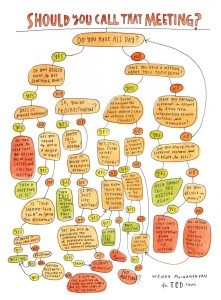Should you call that meeting? : The fine art of meetings
by Katherine Kimball Adelberg, Senior Assistant, INALJ Michigan
 My formal education gave me a great background in theory, but there were many aspects of librarianship that I learned on the job. Handling a screaming toddler, or worse, a screaming parent. Negotiating competing personalities in the workplace. Recently I’ve been working on a small but critical aspect of management: successfully organizing and facilitating a meeting.
My formal education gave me a great background in theory, but there were many aspects of librarianship that I learned on the job. Handling a screaming toddler, or worse, a screaming parent. Negotiating competing personalities in the workplace. Recently I’ve been working on a small but critical aspect of management: successfully organizing and facilitating a meeting.
Why focus on meetings? Shouldn’t we be thinking about ways to avoid them?
As a state government employee, I have some experience with meeting fatigue. However, in my previous work environment, staff never met at all. Working in a busy neighborhood public library with limited staff, we rarely spent time off the desk. Our manager would attend meetings, talk to one person (not necessarily the same person each time), and gradually news about policy changes would trickle down through the staff until it reached the part-timers. Holding quick 10-minute meetings at the beginning of each shift would have been much more efficient and ultimately less maddening for staff that often felt they were one step behind.
That’s an extreme case. Aren’t most meetings unnecessary?
Unnecessary meetings happen every day. When it’s your turn to manage a project, ask yourself: what’s the best way to get this done? Do people need to get to know each other? A meeting (preferably in person) is probably your best bet. Are you approving changes to a document? That could probably be done over email. Are you making an announcement? A short standing meeting or a well-timed email could be all you need. There are many tools in your arsenal; hold formal meetings only when they’re the best option.
OK, some meetings are unavoidable. Why are they so boring?
Here’s a sure-fire way to ensure your co-workers or collaborators are bored to tears: organize a meeting, but don’t mention why. Start with a long preamble outlining a vague, half-formed idea. Don’t ask any questions. Hold it right after lunch (I learned this one the hard way).
Unfocused meetings are boring meetings. In the spirit of Ranganathan’s Fourth Law, it’s up to us to save the time of the meeting attendee. Clearly stating both the purpose of the meeting and what you hope to accomplish demonstrates your respect for your co-workers’ time and effort. Knowing why you’re in the room (or online) together helps everybody stay on track.
What about those meetings when one person won’t stop complaining?
This situation is the most delicate. You’ve developed a great project, and now it’s time to involve other people. You’ve clearly communicated the reason for your meeting and what you hope to accomplish. The stage is set for a productive meeting, but when you’re dealing with other people, anything can happen.
Handling these situations takes practice; no one is perfect. I find it helpful to think about the STATE model from the book Crucial Conversations. STATE stands for:
- Share your facts
- Tell your story
- Ask others’ paths
- Talk tentatively
- Encourage testing
Asking others’ paths and talking tentatively are key. Allowing complainers to speak for a few moments and acknowledging their complaint can be a productive way to redirect them. Asking about their approach and resisting the urge to charge forward with your own opinion (talking tentatively) can be difficult, especially if you’re hosting a meeting about your favorite project. However, following this model will help create a welcoming space for others’ idea and input. After all, you wouldn’t have the meeting if you didn’t need other people to be involved.
Now that I’ve had the chance to organize and facilitate meetings, I have a new appreciation for this small but significant skill set. Scheduling meetings only when necessary, ensuring that objectives are clear, and creating space for collaboration will endear you to your co-workers and make your library a more productive place to work.
If you’re interested in exploring this further, try this TED Talk: How to Save the World (or at Least Yourself) From Bad Meetings.